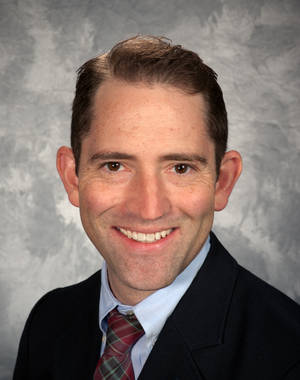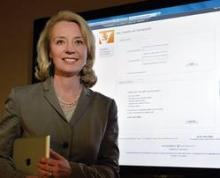User login
A new subspecialty is drawing physicians from diverse medical backgrounds and career settings who aim to combine informatics with providing health care. More than 400 physicians recently became board certified in clinical informatics – the first class of diplomates in the freshly minted subspecialty.
Clinical informatics (CI) has "now become a subspecialty because there are so many people who believe it’s important," said Dr. William Hersh, an internist and chair of the department of medical informatics and clinical epidemiology at Oregon Health and Science University, Portland.
"More and more health care organizations and certainly, almost every large health care organization, have someone who plays the role of chief medical informatics officer. By having a subspecialty, you then give professional recognition to those physicians who play this role. It really takes expertise by someone who understands medicine and understands information systems to make sure things run smoothly."
CI is the application of informatics and information technology to the delivery of health care services. The domain includes a wide spectrum of areas including clinical documentation, order entry systems, system design, system implementation, and adoption issues. While already incorporated into many practices, CI was not a recognized subspecialty until it was approved by the American Board of Medical Specialties in 2011. The American Medical Informatics Association (AMIA) spearheaded the new subspecialty, working for more than 5 years to define and help design the discipline. Physicians who are board certified by any of the 24 American Board of Medical Specialties (ABMS) member boards can now also certify in CI through an exam offered by the American Board of Preventive Medicine. In December 2013, 455 new subspecialists across the country became certified.
One of those alumni is Dr. Hersh, who also serves as director of the AMIA’s clinical informatics board review course.
"I’m proud to be a part of the pioneer class of leaders in this field," Dr. Hersh said in a statement. "When you look at the Accreditation Council for Graduate Medical Education’s (ACGME’s) definition of the informatics discipline, the operative word is ‘transform.’ Every day, informaticians are working in their health care settings to change how we do things, to improve patient care and population health."
Having a far-reaching, positive impact on health populations has long been a primary objective of Dr. Katherine Schneider, a family physician who recently became CI certified. The Pennsylvania doctor started her medical career as the head of a community medicine program, accessing outreach initiatives and working to improve care for the uninsured. She then took on a senior vice president position at AtlantiCare, where she led the system’s strategic transformational work toward accountable care. Dr. Schneider did not hesitate when she learned of the opportunity to become board certified in CI.
"It’s the birth of a new specialty; why not get involved at the very beginning?" said Dr. Schneider, who now serves as chief medical officer for Medecision, a national provider of health care management solutions. CI "by definition, it’s in my everyday work. It’s my role to help make sure we are helping customers use this correctly, understand what our pain points are, and build the right kind of tools to solve problems of effectiveness and efficiency."
Along with bringing new information and technology terms to her current position, her CI training has enabled Dr. Schneider to expand her professional network of clinical informaticians and industry experts, she said.
"One really great benefit is that you meet other people that either do something similar to you or understand the role that you’re in," she said. "Having that peer network is going to be really nice. It’s nice to have recognition that you have expertise in a field. It’s fun to be there at the beginning and participate in the debate about what’s relevant and where it’s going to be in a few years."
For other recently certified physicians, the subspecialty is a door to countless professional paths.
"I became certified to update my skill set and expand my career options," said Dr. Gretchen Purcell Jackson, of the department of pediatric surgery at Vanderbilt University Medical Center, Nashville, Tenn. "I found the quality improvement and project management part of the certification really useful."
In her current practice, Dr. Jackson’s CI training aids in a range of projects, such as helping with a grant she received to study information needs and information management practices of pregnant women and their caregivers.
"The project management aspect of my CI training has been very useful in helping me organize a large clinical study," said Dr. Jackson, who has a PhD in medical information sciences from Stanford (Calif.) University. In addition, "I have recently been asked to help oversee a project that involves coordinating the efforts and technologies from Vanderbilt health information systems, a corporate partner, a non-profit research foundation, and a large funded research project. I use every aspect of my CI training to guide this project. It requires leadership, project management, quality improvement, and clinical and technological expertise."
Meanwhile, Dr. Peter Killoran, a Texas anesthesiologist, is using his CI training to help track patient outcomes and evaluate data for the University of Texas Health Science Center at Houston, School of Biomedical Informatics. Dr. Killoran’s work includes improving health care quality and safety through health information technology and biomedical informatics.
"Quality improvement is a big part of the curriculum for this specialty," said Dr. Killoran, an assistant professor of anesthesiology at the UTHealth Medical School. "That’s because increasingly, medicine is focusing on improving outcomes and the rational use of heath care resources, and all of that comes down to the data."
As the field of CI continues to grow, health providers are needed to participate in the subspecialty and add their voices, said Dr. Genevieve Melton-Meaux, of the department of surgery at the University of Minnesota, Minneapolis, and a faculty fellow for the university’s Institute for Health Informatics. She was recently CI certified.
"The electronic health record and health information technology are the ‘nervous system’ of clinical care," she said. "There are important opportunities to improve the design, implementation, optimization, and use of these technologies and their resultant data, which will ultimately help to improve the efficiency and safety of health care, as well as improve the process of clinical discovery."

|
| Dr. Blake Lesselroth |
The American Board of Medical Specialties' decision to recognize clinical informatics as a board-certified subspecialty heralds an important professional opportunity for hospitalists. Many hospitalists are already an ideal fit to serve as champions in this movement; they boast strong project management skills, possess an understanding of health-systems management, and occupy a central role within their community of practice. Also, medical facilities tend to rely upon hospitalists to implement health information technologies (HIT).
Hospitalists should expect an increased demand for their expertise as regulatory mandates accelerate HIT adoption. However, for their specialty to evolve, hospitalists should consider how formal training in informatics could reinforce their value - especially in a changing health care landscape. First, hospitalists cross-trained in informatics are better positioned to lead system design, apply evidence-based practices to deployments, and promote a constructive culture of innovation. Second, while hospitalists have long been associated with quality improvement research, they will need formal training to effectively guide in the selection, validation, and piloting of performance measures. Finally, membership in the informatics community can increase access to new ideas and products in knowledge systems, computerized decision support, and mobile technologies.
In summary, informatics certification represents one promising path to fostering professional development, guiding HIT development, and enriching a portfolio of scholarship.
Dr. Blake J. Lesselroth is a hospitalist and informatician at Portland (Ore.) Veterans Affairs Medical Center, and teaches medical informatics at Oregon Health Sciences University.

|
| Dr. Blake Lesselroth |
The American Board of Medical Specialties' decision to recognize clinical informatics as a board-certified subspecialty heralds an important professional opportunity for hospitalists. Many hospitalists are already an ideal fit to serve as champions in this movement; they boast strong project management skills, possess an understanding of health-systems management, and occupy a central role within their community of practice. Also, medical facilities tend to rely upon hospitalists to implement health information technologies (HIT).
Hospitalists should expect an increased demand for their expertise as regulatory mandates accelerate HIT adoption. However, for their specialty to evolve, hospitalists should consider how formal training in informatics could reinforce their value - especially in a changing health care landscape. First, hospitalists cross-trained in informatics are better positioned to lead system design, apply evidence-based practices to deployments, and promote a constructive culture of innovation. Second, while hospitalists have long been associated with quality improvement research, they will need formal training to effectively guide in the selection, validation, and piloting of performance measures. Finally, membership in the informatics community can increase access to new ideas and products in knowledge systems, computerized decision support, and mobile technologies.
In summary, informatics certification represents one promising path to fostering professional development, guiding HIT development, and enriching a portfolio of scholarship.
Dr. Blake J. Lesselroth is a hospitalist and informatician at Portland (Ore.) Veterans Affairs Medical Center, and teaches medical informatics at Oregon Health Sciences University.

|
| Dr. Blake Lesselroth |
The American Board of Medical Specialties' decision to recognize clinical informatics as a board-certified subspecialty heralds an important professional opportunity for hospitalists. Many hospitalists are already an ideal fit to serve as champions in this movement; they boast strong project management skills, possess an understanding of health-systems management, and occupy a central role within their community of practice. Also, medical facilities tend to rely upon hospitalists to implement health information technologies (HIT).
Hospitalists should expect an increased demand for their expertise as regulatory mandates accelerate HIT adoption. However, for their specialty to evolve, hospitalists should consider how formal training in informatics could reinforce their value - especially in a changing health care landscape. First, hospitalists cross-trained in informatics are better positioned to lead system design, apply evidence-based practices to deployments, and promote a constructive culture of innovation. Second, while hospitalists have long been associated with quality improvement research, they will need formal training to effectively guide in the selection, validation, and piloting of performance measures. Finally, membership in the informatics community can increase access to new ideas and products in knowledge systems, computerized decision support, and mobile technologies.
In summary, informatics certification represents one promising path to fostering professional development, guiding HIT development, and enriching a portfolio of scholarship.
Dr. Blake J. Lesselroth is a hospitalist and informatician at Portland (Ore.) Veterans Affairs Medical Center, and teaches medical informatics at Oregon Health Sciences University.
A new subspecialty is drawing physicians from diverse medical backgrounds and career settings who aim to combine informatics with providing health care. More than 400 physicians recently became board certified in clinical informatics – the first class of diplomates in the freshly minted subspecialty.
Clinical informatics (CI) has "now become a subspecialty because there are so many people who believe it’s important," said Dr. William Hersh, an internist and chair of the department of medical informatics and clinical epidemiology at Oregon Health and Science University, Portland.
"More and more health care organizations and certainly, almost every large health care organization, have someone who plays the role of chief medical informatics officer. By having a subspecialty, you then give professional recognition to those physicians who play this role. It really takes expertise by someone who understands medicine and understands information systems to make sure things run smoothly."
CI is the application of informatics and information technology to the delivery of health care services. The domain includes a wide spectrum of areas including clinical documentation, order entry systems, system design, system implementation, and adoption issues. While already incorporated into many practices, CI was not a recognized subspecialty until it was approved by the American Board of Medical Specialties in 2011. The American Medical Informatics Association (AMIA) spearheaded the new subspecialty, working for more than 5 years to define and help design the discipline. Physicians who are board certified by any of the 24 American Board of Medical Specialties (ABMS) member boards can now also certify in CI through an exam offered by the American Board of Preventive Medicine. In December 2013, 455 new subspecialists across the country became certified.
One of those alumni is Dr. Hersh, who also serves as director of the AMIA’s clinical informatics board review course.
"I’m proud to be a part of the pioneer class of leaders in this field," Dr. Hersh said in a statement. "When you look at the Accreditation Council for Graduate Medical Education’s (ACGME’s) definition of the informatics discipline, the operative word is ‘transform.’ Every day, informaticians are working in their health care settings to change how we do things, to improve patient care and population health."
Having a far-reaching, positive impact on health populations has long been a primary objective of Dr. Katherine Schneider, a family physician who recently became CI certified. The Pennsylvania doctor started her medical career as the head of a community medicine program, accessing outreach initiatives and working to improve care for the uninsured. She then took on a senior vice president position at AtlantiCare, where she led the system’s strategic transformational work toward accountable care. Dr. Schneider did not hesitate when she learned of the opportunity to become board certified in CI.
"It’s the birth of a new specialty; why not get involved at the very beginning?" said Dr. Schneider, who now serves as chief medical officer for Medecision, a national provider of health care management solutions. CI "by definition, it’s in my everyday work. It’s my role to help make sure we are helping customers use this correctly, understand what our pain points are, and build the right kind of tools to solve problems of effectiveness and efficiency."
Along with bringing new information and technology terms to her current position, her CI training has enabled Dr. Schneider to expand her professional network of clinical informaticians and industry experts, she said.
"One really great benefit is that you meet other people that either do something similar to you or understand the role that you’re in," she said. "Having that peer network is going to be really nice. It’s nice to have recognition that you have expertise in a field. It’s fun to be there at the beginning and participate in the debate about what’s relevant and where it’s going to be in a few years."
For other recently certified physicians, the subspecialty is a door to countless professional paths.
"I became certified to update my skill set and expand my career options," said Dr. Gretchen Purcell Jackson, of the department of pediatric surgery at Vanderbilt University Medical Center, Nashville, Tenn. "I found the quality improvement and project management part of the certification really useful."
In her current practice, Dr. Jackson’s CI training aids in a range of projects, such as helping with a grant she received to study information needs and information management practices of pregnant women and their caregivers.
"The project management aspect of my CI training has been very useful in helping me organize a large clinical study," said Dr. Jackson, who has a PhD in medical information sciences from Stanford (Calif.) University. In addition, "I have recently been asked to help oversee a project that involves coordinating the efforts and technologies from Vanderbilt health information systems, a corporate partner, a non-profit research foundation, and a large funded research project. I use every aspect of my CI training to guide this project. It requires leadership, project management, quality improvement, and clinical and technological expertise."
Meanwhile, Dr. Peter Killoran, a Texas anesthesiologist, is using his CI training to help track patient outcomes and evaluate data for the University of Texas Health Science Center at Houston, School of Biomedical Informatics. Dr. Killoran’s work includes improving health care quality and safety through health information technology and biomedical informatics.
"Quality improvement is a big part of the curriculum for this specialty," said Dr. Killoran, an assistant professor of anesthesiology at the UTHealth Medical School. "That’s because increasingly, medicine is focusing on improving outcomes and the rational use of heath care resources, and all of that comes down to the data."
As the field of CI continues to grow, health providers are needed to participate in the subspecialty and add their voices, said Dr. Genevieve Melton-Meaux, of the department of surgery at the University of Minnesota, Minneapolis, and a faculty fellow for the university’s Institute for Health Informatics. She was recently CI certified.
"The electronic health record and health information technology are the ‘nervous system’ of clinical care," she said. "There are important opportunities to improve the design, implementation, optimization, and use of these technologies and their resultant data, which will ultimately help to improve the efficiency and safety of health care, as well as improve the process of clinical discovery."
A new subspecialty is drawing physicians from diverse medical backgrounds and career settings who aim to combine informatics with providing health care. More than 400 physicians recently became board certified in clinical informatics – the first class of diplomates in the freshly minted subspecialty.
Clinical informatics (CI) has "now become a subspecialty because there are so many people who believe it’s important," said Dr. William Hersh, an internist and chair of the department of medical informatics and clinical epidemiology at Oregon Health and Science University, Portland.
"More and more health care organizations and certainly, almost every large health care organization, have someone who plays the role of chief medical informatics officer. By having a subspecialty, you then give professional recognition to those physicians who play this role. It really takes expertise by someone who understands medicine and understands information systems to make sure things run smoothly."
CI is the application of informatics and information technology to the delivery of health care services. The domain includes a wide spectrum of areas including clinical documentation, order entry systems, system design, system implementation, and adoption issues. While already incorporated into many practices, CI was not a recognized subspecialty until it was approved by the American Board of Medical Specialties in 2011. The American Medical Informatics Association (AMIA) spearheaded the new subspecialty, working for more than 5 years to define and help design the discipline. Physicians who are board certified by any of the 24 American Board of Medical Specialties (ABMS) member boards can now also certify in CI through an exam offered by the American Board of Preventive Medicine. In December 2013, 455 new subspecialists across the country became certified.
One of those alumni is Dr. Hersh, who also serves as director of the AMIA’s clinical informatics board review course.
"I’m proud to be a part of the pioneer class of leaders in this field," Dr. Hersh said in a statement. "When you look at the Accreditation Council for Graduate Medical Education’s (ACGME’s) definition of the informatics discipline, the operative word is ‘transform.’ Every day, informaticians are working in their health care settings to change how we do things, to improve patient care and population health."
Having a far-reaching, positive impact on health populations has long been a primary objective of Dr. Katherine Schneider, a family physician who recently became CI certified. The Pennsylvania doctor started her medical career as the head of a community medicine program, accessing outreach initiatives and working to improve care for the uninsured. She then took on a senior vice president position at AtlantiCare, where she led the system’s strategic transformational work toward accountable care. Dr. Schneider did not hesitate when she learned of the opportunity to become board certified in CI.
"It’s the birth of a new specialty; why not get involved at the very beginning?" said Dr. Schneider, who now serves as chief medical officer for Medecision, a national provider of health care management solutions. CI "by definition, it’s in my everyday work. It’s my role to help make sure we are helping customers use this correctly, understand what our pain points are, and build the right kind of tools to solve problems of effectiveness and efficiency."
Along with bringing new information and technology terms to her current position, her CI training has enabled Dr. Schneider to expand her professional network of clinical informaticians and industry experts, she said.
"One really great benefit is that you meet other people that either do something similar to you or understand the role that you’re in," she said. "Having that peer network is going to be really nice. It’s nice to have recognition that you have expertise in a field. It’s fun to be there at the beginning and participate in the debate about what’s relevant and where it’s going to be in a few years."
For other recently certified physicians, the subspecialty is a door to countless professional paths.
"I became certified to update my skill set and expand my career options," said Dr. Gretchen Purcell Jackson, of the department of pediatric surgery at Vanderbilt University Medical Center, Nashville, Tenn. "I found the quality improvement and project management part of the certification really useful."
In her current practice, Dr. Jackson’s CI training aids in a range of projects, such as helping with a grant she received to study information needs and information management practices of pregnant women and their caregivers.
"The project management aspect of my CI training has been very useful in helping me organize a large clinical study," said Dr. Jackson, who has a PhD in medical information sciences from Stanford (Calif.) University. In addition, "I have recently been asked to help oversee a project that involves coordinating the efforts and technologies from Vanderbilt health information systems, a corporate partner, a non-profit research foundation, and a large funded research project. I use every aspect of my CI training to guide this project. It requires leadership, project management, quality improvement, and clinical and technological expertise."
Meanwhile, Dr. Peter Killoran, a Texas anesthesiologist, is using his CI training to help track patient outcomes and evaluate data for the University of Texas Health Science Center at Houston, School of Biomedical Informatics. Dr. Killoran’s work includes improving health care quality and safety through health information technology and biomedical informatics.
"Quality improvement is a big part of the curriculum for this specialty," said Dr. Killoran, an assistant professor of anesthesiology at the UTHealth Medical School. "That’s because increasingly, medicine is focusing on improving outcomes and the rational use of heath care resources, and all of that comes down to the data."
As the field of CI continues to grow, health providers are needed to participate in the subspecialty and add their voices, said Dr. Genevieve Melton-Meaux, of the department of surgery at the University of Minnesota, Minneapolis, and a faculty fellow for the university’s Institute for Health Informatics. She was recently CI certified.
"The electronic health record and health information technology are the ‘nervous system’ of clinical care," she said. "There are important opportunities to improve the design, implementation, optimization, and use of these technologies and their resultant data, which will ultimately help to improve the efficiency and safety of health care, as well as improve the process of clinical discovery."




